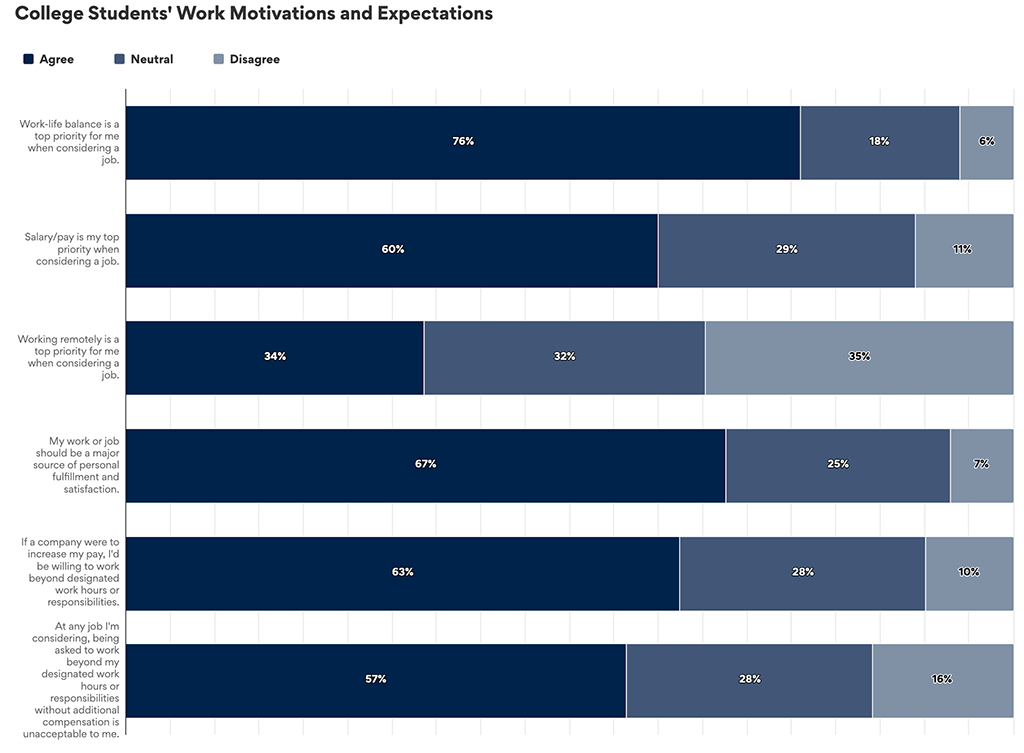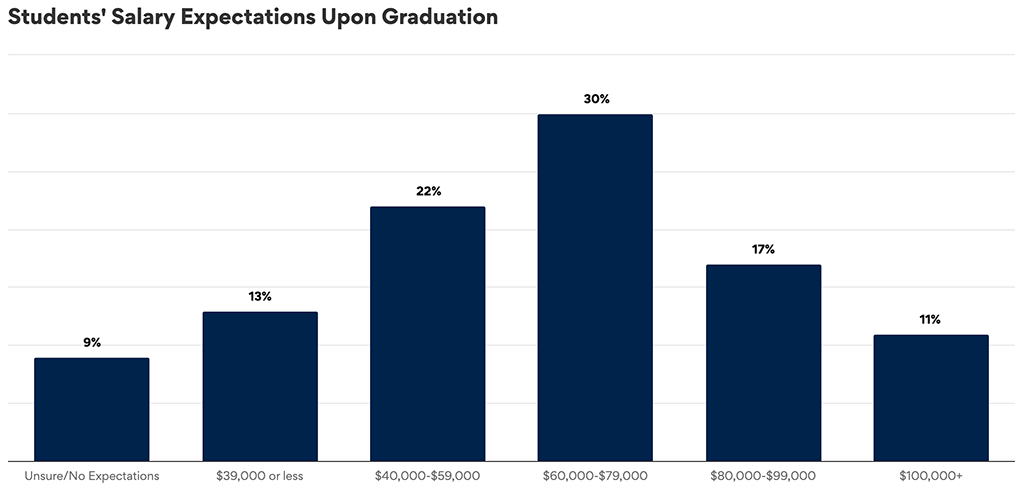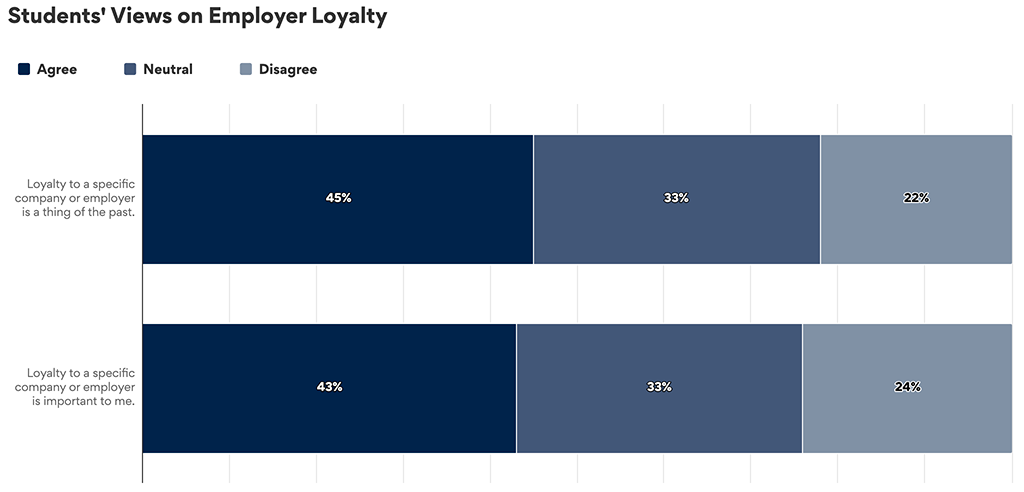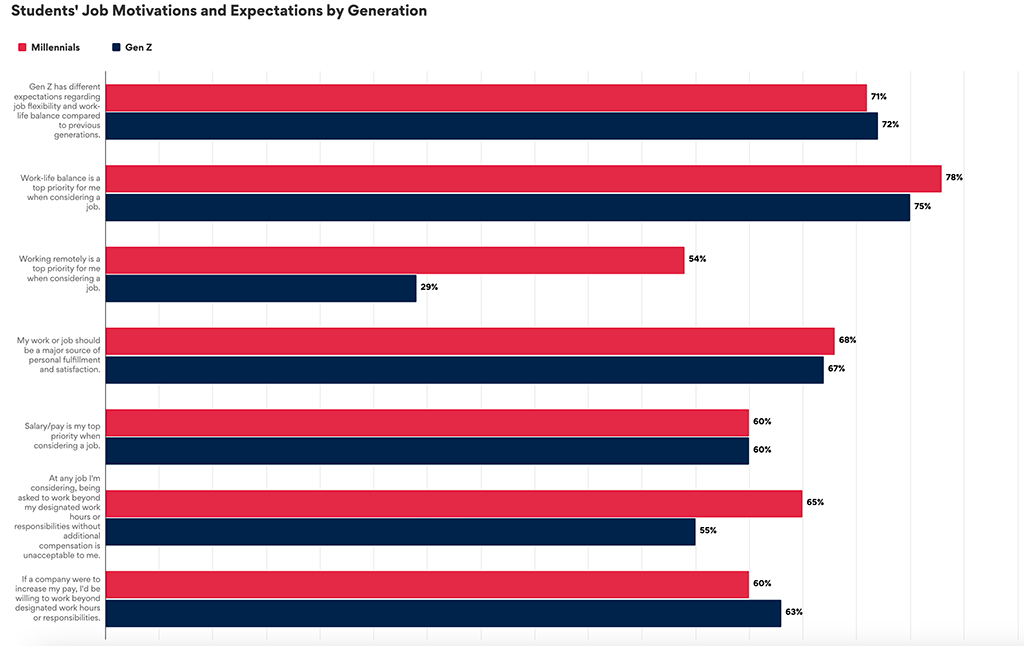Work-life balance tops list of college student priorities in job search: Survey
Published 7:15 pm Monday, May 6, 2024
Work-life balance tops list of college student priorities in job search: Survey
As the class of 2024 enters the workforce, college students are speaking out about what they want and expect in a job.
BestColleges surveyed 1,000 current undergraduate and graduate students, and more than 3 in 4 (76%) say work-life balance is a top priority for them when considering a job. Only 6% disagree, and 18% neither agree nor disagree.
Additionally, 3 in 5 students (60%) say salary or pay is their top priority in considering a job.
Trending
![]()

BestColleges
College Students Speak Out About What Work Expectations Are Important to Them
Around 1 in 3 students (34%) agree that working remotely is a priority for them, another 35% disagree, and 32% are neutral.
“It’s hard to get into the headspace of working when home and work are the same place,” says Jayna Yoo, 22. Yoo is a current senior at the University of Oregon and plans to graduate in June 2024.
Yoo says her challenges with online classes during the pandemic motivated her to apply to in-person jobs, adding that you don’t make as many human connections in a remote setting.
College students want and expect fulfillment from their jobs, be it the human connections Yoo references or some other intangible benefit. Nearly 7 in 10 (67%) say their work or job should be a major source of personal fulfillment and satisfaction.
And, the majority of students are willing to put in more work — provided appropriate compensation. More than 6 in 10 students (63%) say that if a company were to increase their pay, they’d be willing to work beyond designated work hours or responsibilities.
Trending
However, most students (57%) say it’s unacceptable to work extra hours without additional compensation.
Overall, students’ salary expectations generally align with national norms. Three in 10 students (30%) expect to earn salaries in the $60,000-$79,000 range, 28% expect to make more than that, and 35% expect to earn less.
According to the National Association of Colleges and Employers, the average starting salary for college graduates was $61,870 in 2023.
One in 10 students (11%) expect to earn $100,000 or more upon graduation.

BestColleges
Annual Median Salary Expectations Range from $60,000 to $79,000
Women are nearly three times more likely than men to say they are unsure or don’t have salary expectations (11% vs. 4%). Since roles typically come with a salary range, not having a figure in mind could leave you with a salary on the lower end of the range.
Is Employer Loyalty a Thing of the Past?
Almost half of students (45%) say that loyalty to a specific company or employer is a thing of the past. At the same time, over 2 in 5 (43%) also say that employer loyalty is important to them.

BestColleges
What Students Think About Loyalty to Employers
“Personally, I think it’s important to be loyal to a company because when you join a company, you will spend [the] majority of your time in a day working,” explains Anthony Ro, 22.
Ro, a junior at the University of Oregon, adds, “The least someone could do is respect company culture and be loyal” since employers pay their workers wages.
“Overall, I’d say that I consider loyalty to be personally important but not applicable in all fields,” says Vanderbilt sophomore Janice Lee, 20.
“As a student pursuing medicine, I would consider loyalty to be highly beneficial, especially considering mentors along the journey and additional connections,” Lee says. However, Lee notes that students could benefit from a variety of companies and work experiences on their resumes in “computer science and similar fields with less stable markets.”
Data Counters Stereotypes About Gen Z and the Job Market
“On the surface level, it may seem that Gen Z is lazier than other generations,” Lee says, addressing the different stereotypes associated with Gen Z.
More than 7 in 10 college students (72%) — including 72% of Gen Z students, themselves — say Gen Z has different expectations for job flexibility and work-life balance than previous generations. However, survey data tells a different story about the younger generation.
Gen Zers are slightly less likely than millennials to prioritize work-life balance (75% vs. 78%), far less likely to prioritize working remotely (29% vs. 54%), and about as likely to expect personal fulfillment at work (67% vs. 68%) and prioritize salary (60% vs. 60%) above other factors.

BestColleges
Job Expectations Are Close Between These Generations in Most Categories
Additionally, millennials are more likely than Gen Z to say it’s unacceptable to work beyond their designated hours or responsibilities without additional compensation (65% vs. 55%).
Millennials are less likely to say they would work beyond their hours or responsibilities if their company paid them more, compared to Gen Z (60% vs. 63%).
“It is difficult to summarize the overall culture of Gen Z workers,” Lee says. However, she notes certain hallmarks of this generation, including, “higher levels of mental health awareness and recognizing the need [for] balance rather than a constant hustle mentality.”
Methodology
This survey was conducted from March 20-28, 2024, and was fielded by Pure Spectrum. Survey participants included 1,000 respondents nationwide who were currently enrolled in an on-campus (52%), online (16%), or hybrid (32%) undergraduate or graduate degree program. Respondents were 18-62 years of age, with the majority (77%) ages 18-24, and currently pursuing an associate, bachelor’s, master’s, doctoral, or professional degree. The respondents for the survey were screened by various quality checks, including systems like Relevant ID, and responses were manually reviewed to ensure consistency and accuracy.
A note on gender: BestColleges also surveyed non-binary/gender-nonconforming students, but did not surface enough participants in this group to reliably report on their responses.
This story was produced by BestColleges and reviewed and distributed by Stacker Media.





